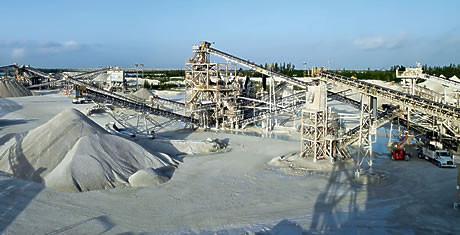SHARE:
Florida Business
Rock and a Hard Place
Threats to state's construction supply of limestone and other "aggregate" material will have a lot to say about building costs in the state.
 Gold Mine: White Rock Quarries, headquartered in West Palm Beach, mines high-quality limestone in the Lake Belt region of south Florida. [Photo: Daniel Portnoy] |
Florida’s leading materials companies are appealing Hoeveler’s ruling. But their most pressing concern at this point is coming up with sources of limestone. “That’s what we’re trying to figure out now,” Florida Rock CEO and President John Baker told reporters and investment managers in a conference call following the ruling. “We just don’t know.”
The state has plenty of potential limestone mines, but urbanization and local land-use regulations preclude developing most of them; it’s neither quick nor easy to permit a rock mine in Florida, especially a large one.
Herbert, author of a recent DOT study on the industry, says the Lake Belt contains the hardest and most durable geologic formation in the state. Florida has six “mega-mines,” he says, those among the top 10 in production in the United States. And five of those are in the Lake Belt. The sixth mega-mine is in Lee County, but it lacks rail access and serves only southwest Florida.
Although limestone mines operate in 22 of Florida’s 67 counties, Herbert says, only six clusters have significant reserves: Miami-Dade/Broward; Palm Beach; Collier/Lee; Lake/Polk; Hernando/Sumter/Citrus; and Taylor/Dixie. But those mines, too, face water-quality and other environmental and public health questions as development rolls closer. Palm Beach County, for example, has been debating the future of mining in the Everglades Agricultural Area.
 U.S. District Court Judge William Hoeveler was clearly disturbed by regulators’ stewardship of the Lake
Belt. “This court has never seen a
federal agency respond so indifferently to clear evidence of significant environmental risks,” he wrote. U.S. District Court Judge William Hoeveler was clearly disturbed by regulators’ stewardship of the Lake
Belt. “This court has never seen a
federal agency respond so indifferently to clear evidence of significant environmental risks,” he wrote. |
The uncertainty over Lake Belt mining is playing out against a backdrop of other forces rocking the industry. For one, a downturn in the residential housing market has sharply reduced demand for cement and other materials here. Florida’s demand has fallen more than 12%, says Ed Sullivan, chief economist at the Skokie-Ill.-based Portland Cement Association, compared to a 4.4% decline nationally. Sullivan expects at least another year of slack demand. The Lake Belt provides so much of Florida’s materials supply that scarcity could be an issue despite lower demand from residential construction. The DOT, for example, remains on a buying binge of materials.
In addition, a global trend has seen Florida’s rock companies targeted for mergers and acquisitions by national and international competitors that need a beachhead in America’s Sun Belt. For example, Anderson Columbia sold half of its Suwannee American cement plant near the Ichetucknee River and its Jacksonville Trinity Materials operations to Brazil-based Votorantim Cimentos, one of the largest cement companies in the world. Jacksonville-based Florida Rock Industries is being acquired by Birmingham-based Vulcan Materials Co., the largest producer of construction aggregates in the United States.























